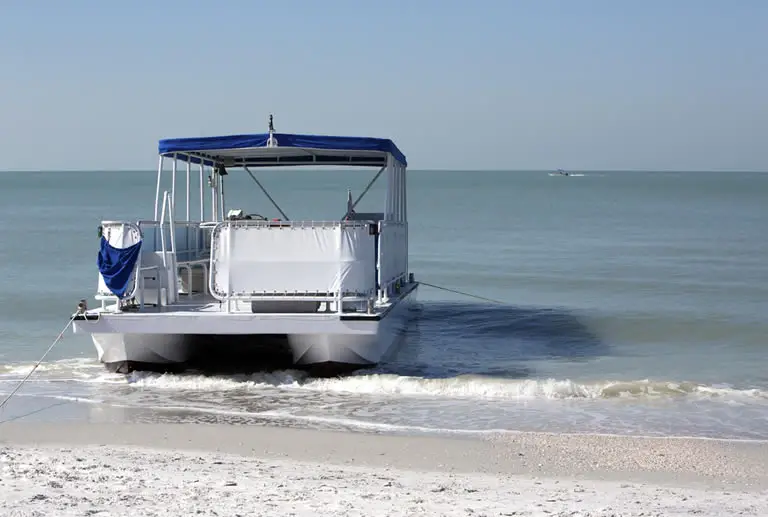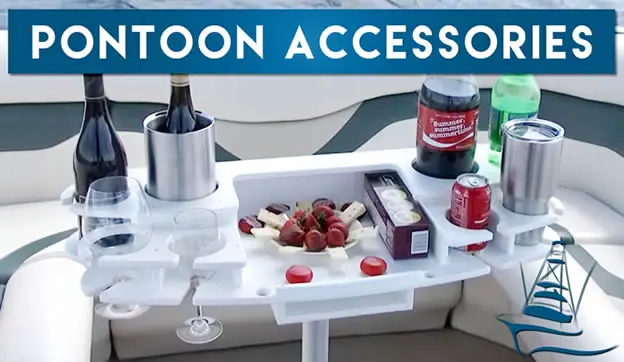Pontoon boats are no longer the simple sluggish flat platforms they started out as. These days modern pontoon boats are impressive, luxurious speed boats that can be used for the same type of water based activities as any other powerboat. But, with their shallow draft, and flat bottomed aluminum hull, are pontoon boats good for salt water use?
Pontoon boats are not made for salt water use but this does not mean you cannot use them in salt water if you take proper precautions. The aluminum must be properly protected against galvanic corrosion. Turbulent ocean saltwater swell will prove dangerous to a pontoon boat so you must stay close to shore and only venture out in optimal weather.
A protected saltwater bay, inlet, or mangrove swamp is more suitable for a pontoon boat pontoon than the open ocean.
Contents
The truth about saltwater pontoon boats
Are pontoon boats good for salt water?
The answer to the question posed above is not a simple “yes” or “no”.
Pontoon boats can be used in salt water but only if you take proper precautions, both to protect your boat and also to protect everyone on it.
There are two major concerns about using a pontoon boat in saltwater. They are:
- Galvanic corrosion.
- Ocean swell.
Both these concerns pose a real problem to pontoon boats and therefore the boat owner must take definite steps to protect the pontoon boat and to protect everyone who is on board it.
Let’s look at both these potential problems when using a pontoon boat in saltwater and what you can do to minimize the dangers they present.
The trouble with aluminum pontoon boats in salt water
A pontoon boat can be made from a range of different of materials from aluminum to fiberglass.
However, the pontoon tubes, upon which the pontoon boat sits and floats (see our guide to how a pontoon boat works) are almost always made from aluminum.
Although small inflatable pontoon catamarans can have pontoon tubes that are made from a plastic, almost all larger vessels will have aluminum pontoons.
Aluminum and salt water do go well together.
Aluminum corrodes quickly in salt water due to a natural chemical-electrical reaction known as galvanic corrosion. This type of corrosion acts quickly to eat away at the aluminum of a boat.
As pontoon tubes are hollow, being completely empty or filled with pressurized air, it won’t take long for the effects of galvanic corrosion to eat its way through the tube forming holes that will let water in.
When water enters a tube on a pontoon boat is upsets the entire balance of the boat and makes the boat sit dangerously low in the water. This is a problem even in flat water as it can result in a pontoon boat nosediving or even sinking. It is an even bigger problem in saltwater though, due to the more turbulent nature of the ocean.
How to protect aluminum pontoons from salt water corrosion
If you intend to use a pontoon boat in saltwater you must take steps to protect the hull and the pontoons from galvanic corrosion.
There are two things you can do to protect your aluminum pontoon boat from galvanic corrosion and you should use both, especially on the pontoons. They are:
- Use aluminum boat paint.
- Attach sacrificial anodes.
Use aluminum paint
Using a aluminum paint that is designed to protect the aluminum from corrosion is the first step you should take for protecting your boat from galvanic corrosion.
Interlux and Pettit sell copper-free, aluminum-compatible paint systems that will help protect your boat. You can also get the excellent marine ablative antifouling bottom paint which is both copper-free and formulated to give aluminum galvanic corrosion in addition to antifouling protection.
Attach sacrificial anodes to the boat
Sacrificial anodes are essential for protecting aluminum that is used in saltwater.
Sacrificial anodes are small pieces of metal that are attached to areas of the boat where it comes into contact with saltwater.
How do they work?
To understand how a sacrificial anode works you need to first understand how galvanic corrosion occurs. I covered this subject in much more depth in the article do pontoon boats need anodes and you should definitely read that article if you intend to use your pontoon boat in saltwater.
Water is a very conductive material. So, electrical currents flow easily through it. Galvanic corrosion occurs when two different types of metal form an electrical current between each other in the water. This electrical connection acts in a similar way to a battery.
The conductive material, in this case the water, allows electrons to flow from the more active metal (the anode) to the lesser active one (the cathode). As the current flows, and thus the electrons move from the anode to cathode, the anode starts to deteriorate as it loses electrons.
Unfortunately, in saltwater this means the aluminum in your boat acts as the anode and thus its electrons are the first to go. The effects of this are corrosion.
In order to stop this process from happening to the aluminum in your pontoon tubes, lower deck area (and maybe your outboard motor’s propeller as well) you need to add specific metal attachments to your boat that will act as sacrificial anodes. These sacrificial anodes lose their electrons first so that the corrosion occurs on the anodes rather than the aluminum on your boat.
To achieve this effect you need a specific type of metal which has properties that attracts the electrical connection to itself (that leads to it losing its electrons) so the electrical connection does happen to the aluminum. This metal is zinc.
Zinc is not as chemically active as aluminum and will therefore corrode first.
By connecting zinc anodes to the aluminium of your boat these anodes will act as a “first layer” of protection. The zinc will shed its electrodes first, stopping the aluminium from giving up its own.
This means the process of galvanic corrosion corrodes the zinc before it gets to the aluminum. The zinc anode is sacrificed to save the aluminum. Hence the name sacrificial anode.
As the zinc anodes become corroded, which can happen very quickly, they will need to be replaced. If they are not replaced then the galvanic corrosive effect will start working on the aluminum on your boat.
Zinc anodes are cheap and easy to attach to your boat. They are just as easy to detach when they are spent. There are some great zinc anodes available for pontoon boats which you can check out here.
If you plan to use aluminum paint (which you really should) do not paint the sacrificial anodes as you want them to corrode!
The dos and don’ts of taking a pontoon boat in the ocean
You now know how quickly salt water can corrode the aluminum hull of a pontoon.
However, I have highlighted that there are steps you can take to protect your boat from that corrosion. So, this obviously means you can take your boat out into open seas because you can protect it from ocean salt water … right? Can you take a pontoon boat in the ocean?
For the most part there are very few saltwater lakes in existence, at least there are very few in America. So, unless you intend to launch your pontoon boat on The Great Salt Lake I can safely assume that your intention is to use use it in ocean waters.
Galvanic corrosion is not the only problem you will have to deal with if you take a pontoon boat into ocean waters.
As a pontoon boat has a shallow draft, and a hull shape that is designed for calm inland water bodies, it stands to reason that it is probably not the best choice for ocean use. But this does not mean it cannot be used in the ocean under certain strict conditions. You will need to take extra precautions when you take your pontoon boat into the ocean.
Pontoon boats are not designed to ride ocean swell. They are calm water boats that perform best when used on inland water bodies, like lakes.
To use a pontoon boat in ocean water you must follow some very strict rules if you want to avoid sinking your boat.
Rules for using a pontoon boat in the ocean:
- Know what the weather will be like before you hit the water.
- Never venture far from the shoreline.
- At the first sign of adverse weather conditions head for shore.
- Avoid taking large waves head-on.
- Slower is better.
- Be aware of the effects of waves crashing over the deck.
Are pontoon boats safe in the ocean? – Pontoon sinks in ocean water (video)
If you plan to take your pontoon boat into ocean waters or other saltwater bodies, especially if you intend to have a pontoon boat party, then check out these other pontoon boat accessories that can make the entire experience a lot more fun and a lot safer.
The proper precautions you must follow before you take a pontoon boat in the ocean
As pontoon boats are not ocean-worthy vessels you must be very selective about the type of conditions you use the boat in.
Never venture out into ocean waters, no matter how close to the shore you intend to boat, when there is windy weather predicted. Wind equals waves. High winds equals high waves. A pontoon boat does not have the type of hull design that can ride a large wave or even a medium sized one (see video below).
To ride ocean waves you need a v-hull boat, preferably a deep v-hull boat, with a pointed bow that can cut through the chop. A pontoon boat is basically a big, almost square, floating platform with a blunted stern and equally blunted flat bow, that sits on two hollow tubes. This may be a fantastic design for certain inland water-based activities but it is not a great design for use on the ocean. So be careful!
When you do hit the water make sure you stay within visual distance of the shoreline as this will give you plenty of time to get to safety if conditions start to deteriorate quickly. The closer you can keep to the shoreline the safer you will.
Remember, a pontoon boat is a shallow draft vessel that is designed to be used in calm water or very shallow water. In fact it has such a shallow draft that you can even beach a pontoon boat. So don’t worry about running aground – though do be aware of how deep your boat is in case you need to trim the motor and lift the prop up as you enter shallow water areas.
Be vigilant when out on the water. No weather prediction service is infallible. Sometimes they get it wrong. No matter what the weather forecast says, if you see signs of adverse weather closing in head for shore.
Bad weather and high winds creates choppy, turbulent water. It is dangerous to be on a shallow draft boat in heavy ocean swell. Pontoon boats are not designed to handle rough water and they will sink in turbulent ocean swell.
This brings me to the point of ocean waves and how you should handle them when on a pontoon boat. Taking on small waves in the ocean is fine but be wary of larger waves and show them the respect they deserve. The bow of a pontoon boat cannot cut through chop so the wave will wash over the boat.
Review the video below to see how the pontoon boat owner is recklessly motoring into ocean waves and causing them to wash over the boat.
Waves don’t just hit head-on though.
As the deck of a pontoon boat is wide and flat you should also be aware of the possible dangers of a wave sweeping over the boat.
A wave that breaks over the rails of a pontoon boat can easily sweep everything on the deck overboard and knock people off their feet!



